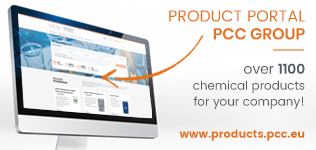Requirements for drivers
At PCC Rokita SA, most used and manufactured products, due to the hazards they pose to health, safety, property or the environment, constitute hazardous goods. Their transport is performed in accordance with terms and conditions specified for each kind of transport (ADR, RID, IMDG).
In order to ensure safety during transport of hazardous goods, PCC Rokita SA undertakes and applies appropriate measures minimizing hazards during their relocation, such as supervision and inspection of transport and reloading activities, constant monitoring of reloading sites, and patrols of the Site Emergency Service. Drivers delivering or receiving hazardous goods are obliged, before entry to the facility area, to put on protective shoes and clothing, and to possess other personal protective equipment appropriate for the hazard posed by the transported goods. In loading and unloading areas, transport participants should apply additional personal protective measures according to signage, for example, observing the obligation to use protection for the head, eyes and hands. In terms of their construction, safety and environmental care, loading and unloading areas meet the highest European norms and standards.
With the safety of people, property and environment in mind, and following the initiative of the Polish Group for Chemical Safety attached to the Polish Chamber of Chemical Industry, the manufacturers associated with this organization (including PCC Rokita SA) have have created the System of Hazardous Materials Transport Assistance (System Pomocy w Transporcie Materiałów Niebezpiecznych, or SPOT). This is a system of information which also provides technical assistance in case of an incident/accident during transport of hazardous materials by supporting operational activities of the State Fire Service and other domestic emergency services.
PCC Rokita SA, through its emergency service and experts, can provide fast and professional aid during chemical-related incidents/accidents at three aid levels:
• LEVEL I ‒ advice over the telephone
• LEVEL II ‒ advice at the site of an incident/accident
• LEVEL III ‒ technical assistance at the site of an incident/accident.
SPOT is connected with the principles of the Responsible Care Programme and demonstrates how seriously the chemical industry treats its responsibility for safety, health and environmental protection, as well as directly confirming that responsibility for what is manufactured in chemical plants does not end just outside the door.





